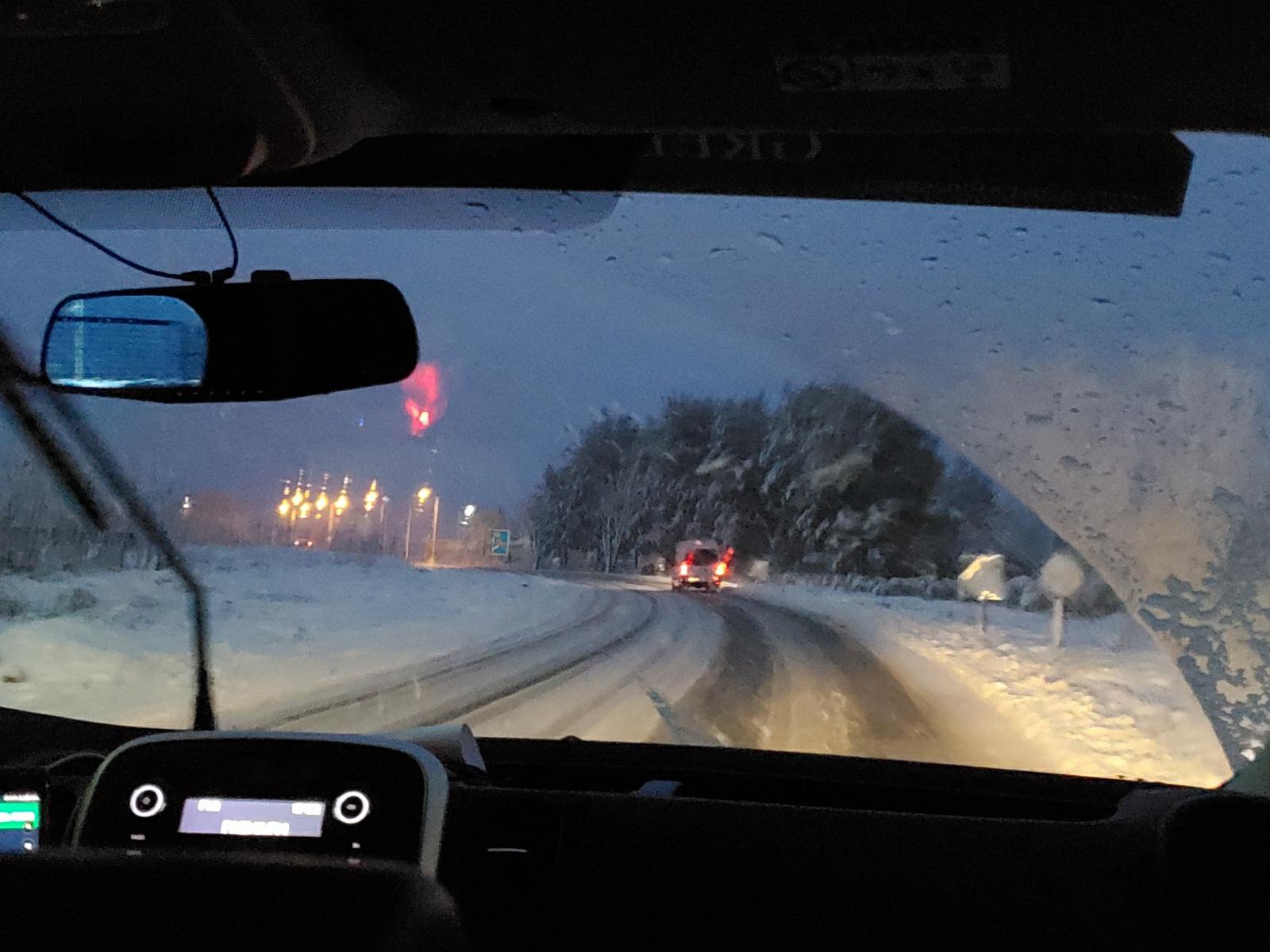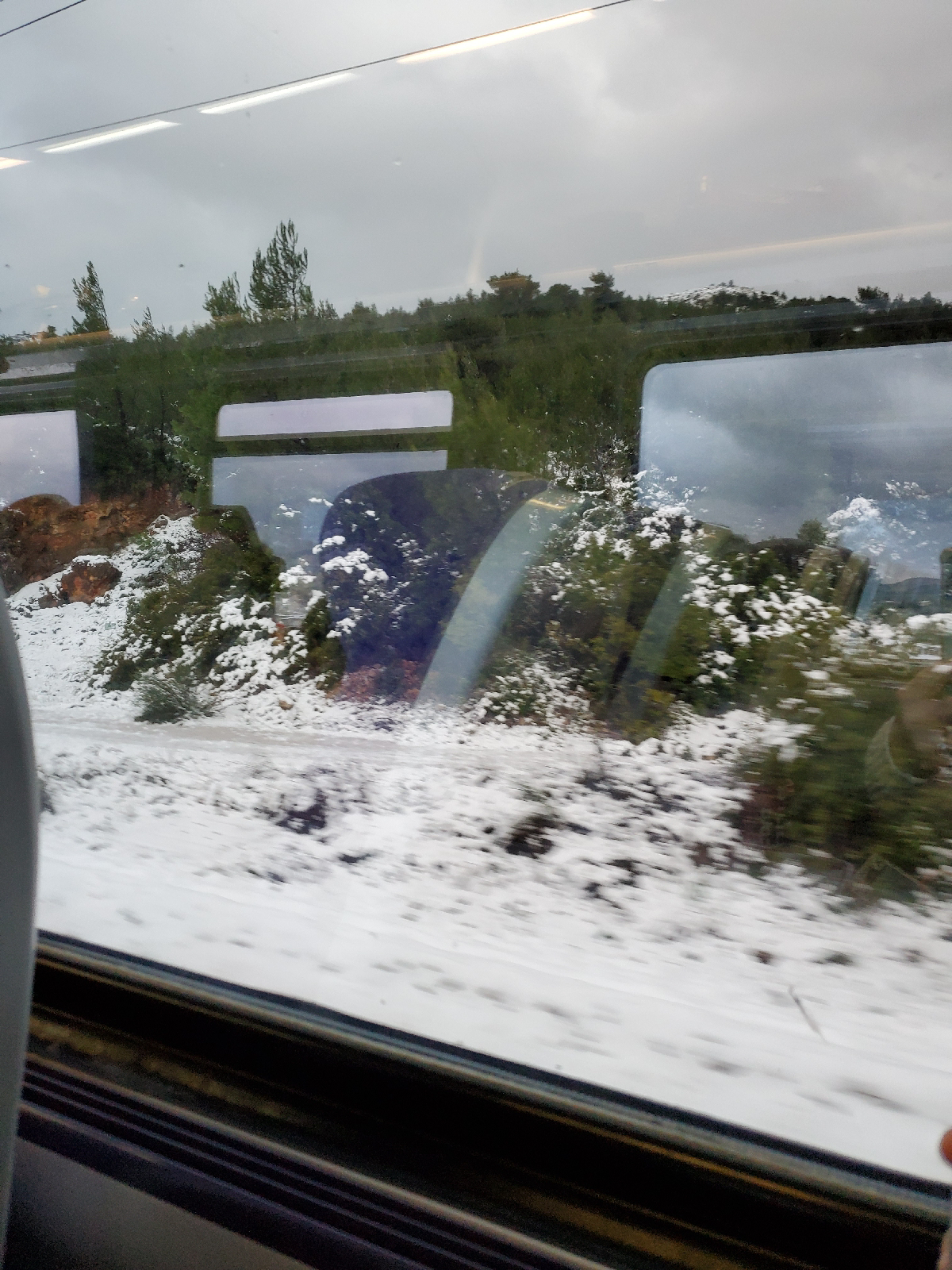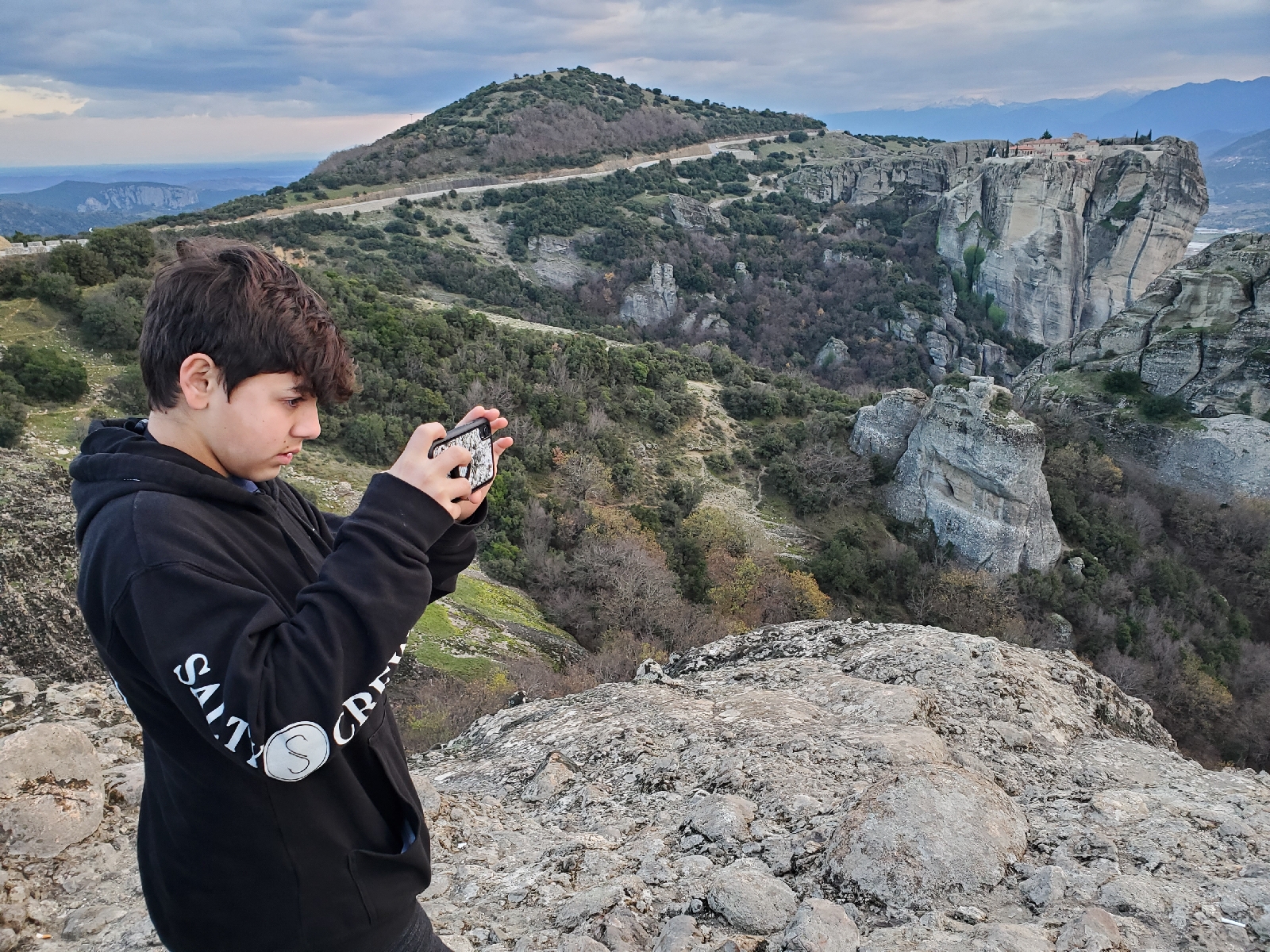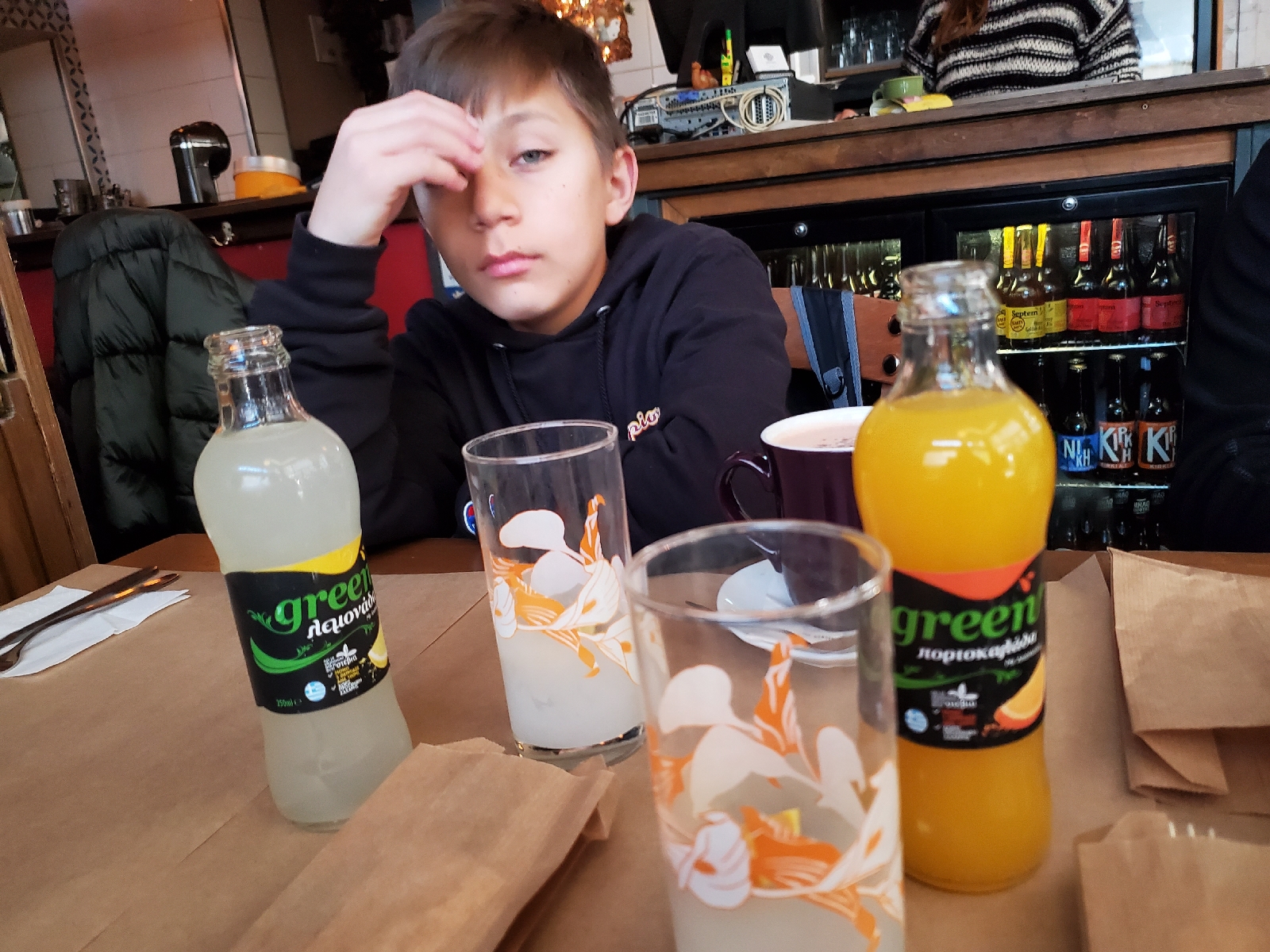Below is the view of Meteora from our hotel balcony. Remarkable that none of the monasteries are visible until you drive up the road to them. We are sad we didn't spend more time here. But we must go any way.
The Drive:
Instead of taking the train back, we opted for a driver who will stop at key points on the way back to Athens.
The sites are interesting, when there are some, mostly the drive back is an educational experience. Our driver was born and raised in Athens and once we engaged him in conversation about what it has been like growing up in Greece, we gained context from our impression on the train of the economic state of the country. He and the other guides have strong opinions about the EU creating the economic crisis in their country and a corrupt government filling their pockets fat with monies from the proceeds of imports and exports.
Greece's responsibility towards import and export seems to be holding the Greeks hostage. For instance, in the last posting I observed many barren agricultural plots, dilapidated factories, and limited industry. Based on our driver's explanation, some time ago the EU had made an agreement with some of the farmers to cut down their olive trees to manage exports. In doing so, the EU agreed to pay the Greek farmers a certain amount of money every year for halting their farming to control excess exports. The Greek farmers did not fully understand that after 15 years, the EU would stop paying them, and they could begin farming olives once again. The issue was the amount of money and time it takes to grow an olive tree that is capable of harvesting olives worthy of oil and food production. Some of those farmers never afforded replanting and even if they could they would be without proceeds for many years. possiblyanother 15 years.
The sites are interesting, when there are some, mostly the drive back is an educational experience. Our driver was born and raised in Athens and once we engaged him in conversation about what it has been like growing up in Greece, we gained context from our impression on the train of the economic state of the country. He and the other guides have strong opinions about the EU creating the economic crisis in their country and a corrupt government filling their pockets fat with monies from the proceeds of imports and exports.
Greece's responsibility towards import and export seems to be holding the Greeks hostage. For instance, in the last posting I observed many barren agricultural plots, dilapidated factories, and limited industry. Based on our driver's explanation, some time ago the EU had made an agreement with some of the farmers to cut down their olive trees to manage exports. In doing so, the EU agreed to pay the Greek farmers a certain amount of money every year for halting their farming to control excess exports. The Greek farmers did not fully understand that after 15 years, the EU would stop paying them, and they could begin farming olives once again. The issue was the amount of money and time it takes to grow an olive tree that is capable of harvesting olives worthy of oil and food production. Some of those farmers never afforded replanting and even if they could they would be without proceeds for many years. possiblyanother 15 years.
Unfortunately, the farmers had believed they were getting over on the EU rather than the EU getting over on them. On the import side of the problem our driver explained that they cannot even make their own toothpicks they must import them. Which impacted many businesses and factories.
These are lessons of the downside to the relationship with the EU for Greece. They have recently elected a new prime minister as of July, and their unemployment is down to 20% from 28%, but many of the youths have found work in other countries so it may be awhile for them to recover, especially if their fertility rate remains low (a $2,000 incentive to have children may not be tantalizing enough, as researchers have shown that such incentives have done little to encourage women to have more than 1 child per family, which is not enough to replace the future workforce, but only time will tell).
On a positive note: we discovered a massive orchard of olive trees.
Both sides of the road are olive trees. Still no animals other than feral cats and some roaming dogs though. Maybe meat is imported.
We stopped briefly in Trikala to see the clock tower which is also part of their medieval fortress. This is no longer a tourist attraction and the small village no longer has a booming economy so there is not much else to see here that does not relate back to the theme of the stories and concerns I have about the current economic conditions of Greece. Soon we moved on to Delphi.
Delphi, on the other hand, is up in the mountains and it is known as a popular ski town, much like a Park City, Lake Tahoe, or Big Bear type destination in the states. Of course, we had to stop and play a bit in the snow so we could amuse our driver.
Delphi is adorable and fruitful this time of year. We planned on going to their historic museum with sarcophagus and ruins. However, when we stopped for lunch, we met Dominique from New Zealand who is on holiday from University. She was coming from Athens by bus and on her way to Meteora. She related with us on the heaviness of the condition of Greece. We also learned from her that New Zealand gives China bottled water for free which upsets her and other New Zealanders. We shared food and conversation and lost track of time so much so that we got to the main museum just as they were closing the security gates. We settled instead on taking pics out front with one ancient sarcophagus.
Back in the van and on the road again, James fills us in on a history lesson he recalled learning in high school (1988), which was exactly one sentence..."Delphi was a powerful woman who was known as an oracle." Our driver perhaps feeling bad we missed our stop adds, "This area of Delphi was protected by females only. And then the ancient Greeks came in and the men would rape the women of Delphi. Then they decided to take the young women and hide them down the hill somewhere and left only the old women to protect Delphi," shortly after our laughter ended he said, "Now let's stop and take a picture over here." And so we stopped at a popular scenic spot outside the town of Arachova.
On and off since Trikala snow flurries were following us through the mountains. Quite a bit had collected by the time we were leaving Delphi. When we reached Thebes, the roads had closed. We were maybe twenty cars from the closure.
We sat in a gas station for 3 hours listening to the news in Greek. Our driver explained that the people are complaining that the government is not using the 80 machines they have to clear the roads. The government responded saying by 9PM the roads will be open. It is 8:15PM now, so we will see.
On the bright side. If we had had the time to spend at all our stops then perhaps we would be far from a gas station, without toilets and seating and food and drink. Our driver further validated that we were "...lucky in our bad luck, " because were were not stuck on the toll roads.
Travel Tip: Be cool. Things go off track sometimes. Remember Gilligan's Island and then sing the theme song to the Greek tour driver like James did and all will laugh. Be prepared. We have our Potty-on-the-Go kits, and the long line of other women are at a loss for TP, hand towels, etc. Recall, that the driver left from Athens at 4:30AM to pick us up, and does not have his family with him. and it will be well after 10pm before he gets back home. Focus on being lucky enough to have a great driver.












































































